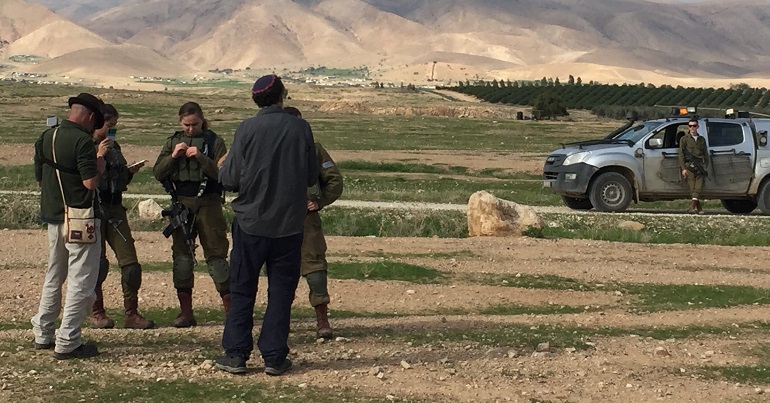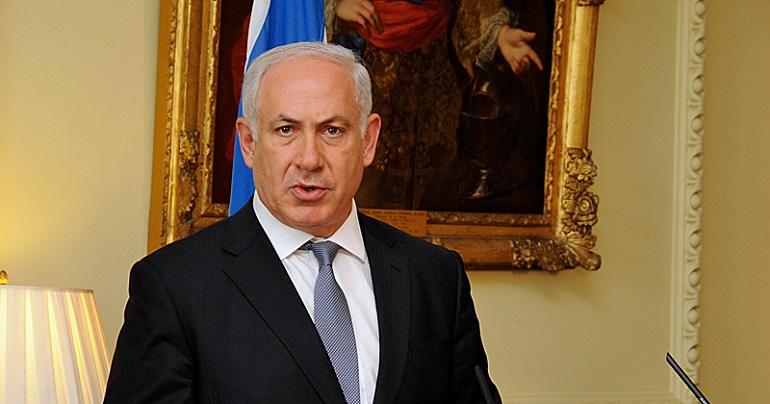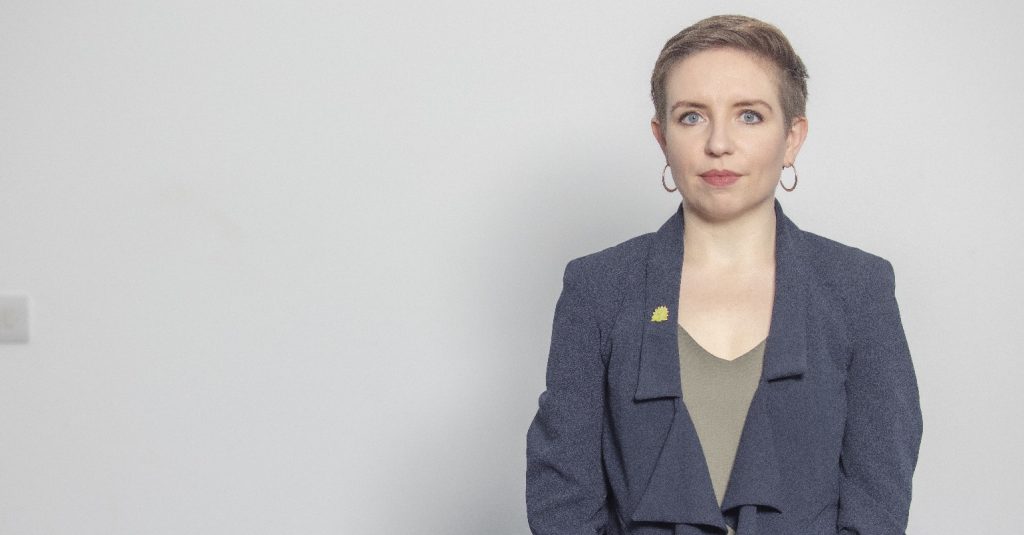Eyes on the occupation: In the Jordan Valley, there’s nowhere else to look.

In late January, still weeks before coronavirus had swept across the globe, I travelled to Jerusalem. Although this was first and foremost a family visit, a space to reconnect after a long period of absence, it also provoked deep reflection on the political conflict that paralyses the region.
Fifty years of military occupation has fractured Israeli and Palestinian society, and my sudden proximity to this contested territory reignited my discomfort at entering a space where I was already, inadvertently, an unwilling accomplice. I might not reside in Israel, but as a Jew, I inevitably find myself entangled in the region’s fraught politics. When Benjamin Netanyahu claims to act on behalf of ‘all Jews’, invoking the professed status of Israel as a ‘safe haven’ to justify the pursuit of irredentist territorial expansion, the diaspora becomes necessarily involved. As Israel’s triumphalist government prepares to annex the occupied West Bank, there is a renewed urgency to proclaim: ‘not in my name’. Silence is complicity. An increasingly virulent ethno-nationalism has begun to thrive, and like Covid-19, if allowed to spread unchallenged, it promises ugly results.
Ta’ayush: From coexistence to co-resistance
To this end, in the final days before my departure, I joined with Ta’ayush (Arabic for “living together”), a grassroots movement of Arabs and Jews who have for the past twenty years sought to strengthen common ties in the name of resisting the occupation. As their website explains, in a powerfully worded declaration of solidarity:
We — Arabs and Jews, Israelis and Palestinians — live surrounded by walls and barbed wire: the walls of segregation, racism, and discrimination between Jews and Arabs within Israel; the walls of Apartheid, closure and siege encircling the Palestinians in the occupied West Bank and Gaza Strip; and the wall of war surrounding all inhabitants of Israel, so long as Israel remains an armed fortress in the heart of the Middle East.
Through sustained efforts to support communities across the West Bank, this movement has built trust and recognition across cultural divides, participating in olive harvests, resisting housing demolitions, and holding the Israeli military and settlers to account for abuses perpetrated against Palestine’s civilian population. I travelled with them into the West Bank as a volunteer, to witness their work first hand.
The struggle for survival in the Jordan Valley
At first sight, the Jordan Valley is a harsh landscape. Travelling east from Jerusalem, speeding past checkpoints and walls of the notorious separation barrier, urban greenery rapidly gives way to rocky, mountainous terrain, with the smooth tarmac of the highway cutting through steep slopes of muddy red stone, it is easy to succumb to the illusion that this arid land is an empty desert, devoid of interest, bereft of life. Yet this appearance belies the fact that it remains both a key ‘strategic asset’ to Israel, designated as Area C under the 1994 Oslo Accords, and the foundation of livelihoods for the Palestinian Bedouin, who for generations have lived off this land.
As we drove down into the valley, Arik, a Rabbi from the human rights organisation Torat Tzedek (Torah of Justice), provided an orientation to contextualise Ta’ayush’s activities. Since 1967, interruptions to the lives of Bedouin shepherds have become the norm, as communities are forced to contend with the threat of violence, harassment, and intimidation from an aggressive Jewish settler population, aided and abetted by a compliant Israeli Defence Force (IDF). Our role as volunteers was to accompany shepherds as they took their livestock out to roam on customary grazing lands. Through monitoring military and settler activities, and intervening where necessary, Ta’ayush has been able to defend the legitimate presence of the Bedouin in the valley against harassment or expulsion, maintaining the right of herders to carry out their work undisturbed. In the words of Arik,
We can also wear the army down. In several locations they have indicated that they don’t want to expend so many resources chasing after sheep and goats.
Rough justice
There is a paradoxical tranquility to the Valley. Counterintuitively, much of my time was spent in peaceful serenity, with barely any sound apart from the bleat of goats and faint tinkling of bells. Although some Bedouin have now adopted sedentary lifestyles, their nomadic existence is written into the hills. Yet violence can flare up at any time. Settlers had previously chased off flocks, acted aggressively against Bedouin herders, and physically pushed volunteers to the ground. In the most serious incident, masked settlers have beaten Ta’ayush volunteers, in one case using pepper spray to drive them away. Meanwhile, the Israeli military frequently issues 12 or 24 hour ‘temporary closure orders’ to expel shepherds from their pastures. The IDF claims that swathes of the Valley are under state ownership and demarcated as a military zone. Yet tellingly, it is only the Bedouin who face eviction, and settler colonisation of these lands continues unabated.
The military arrive.
Every day I was there, it was the same: the sight of a silver 4×4 driving towards us announced the arrival of the military, interrupting the sleepy afternoon. Soldiers would come out and tell the Bedouin to move away. Ta’ayush activists would calmly but forcefully explain the rights of shepherds to graze unimpeded. Each side filmed the other in case the situation escalated. Soldiers would demand to see our IDs. Eventually, they would drive away and the tension would subside.
As a non-Hebrew speaker, I was unable to follow the dialogue, but I was told that without the presence of external observers, the military would have likely ordered the shepherds to return home. Activists had recently contacted the office of the army’s legal advisor to challenge the use of temporary closure orders, but the military now invoke ‘lack of ID card’ as a pretext for expelling herders without official orders. Bedouin are reluctant to show ID, due to the risk of confiscation (and the prospect of long delays retrieving them from checkpoints), and therefore find it more preferable to return home than identify themselves to the military. Such is the power of the bureaucratic state to subdue and intimidate colonised subjects.
According to Ta’ayush activists, soldiers would often come to move on shepherds at the behest of Omer, a settler who had enclosed adjacent land for a date palm plantation. After a spate of attacks, complaints had been raised by both Bedouins and settlers at the police department, with a restraining order request submitted by the shepherds to prevent further outbreaks of violence. Yet Ta’ayush complains that authorities have not acted as a neutral arbiter: they display leniency towards the settlers, and in one case, threatened to arrest a Bedouin attempting to lodge a complaint. The drama playing out in this small stretch of land remains symptomatic of a much broader political malaise.
Dancing between hope and despair
The occupation of Palestine has bred alienation, dehumanisation, and immiseration on a massive scale. To push this away into the background is to submit to the same fatalistic nihilism that has created the conditions for the far-right to flourish. As Nur Masalha observes, cultural erasure is an endemic feature of Israel-Palestine, where a lethal combination of fear and fatigue have dislodged any belief in a peace process. Whilst recognising that no single group has a monopoly on atrocities committed, it is senseless to condemn ‘both sides’ as bearing equal responsibility in an asymmetrical conflict where one hegemonic group exercises control over others. The plight of the Bedouin is just one aspect of the brutal occupation that impedes and entraps the lives of millions.
As Netanyahu prepares for full annexation of the West Bank, the time has come for an honest appraisal of how the Jewish diaspora relates to the state of Israel. While Jewish identity is frequently instrumentalised to consolidate territorial control, it’s hard to reconcile the systematic appropriation of Palestinian land with any recognisable Jewish values. The Torah teaches Tzedek, tzedek, tirdof (‘justice, justice, you shall pursue’); we can be vigilant in calling out antisemitism wherever it occurs, but this does not occlude the need to confront Israel’s flagrant abuse of political power. We need to demolish the founding myths about Israel (‘a land without a people for a people without land’), challenge the false equivalence between an occupying power and a colonised people, and build pressure in our communities for immediate withdrawal from the West Bank and an end to the blockade of Gaza.
Actions have consequences. The refusal to initiate early testing allowed Covid-19 to spread. Our reluctance to confront oil dependency has led us down the path of catastrophic climate breakdown. And the failure to mount a robust challenge to far-right ethno-nationalism will accelerate Israel’s slide towards apartheid rule. Surely it is possible to locate a set of Jewish values that does not depend on defence of a rogue state, which seeks to consolidate its existence by trampling on the rights of others. Let’s socially distance ourselves from the zealots who claim to speak in our name, stand in solidarity with struggles for dignity and justice, and create a better world for all.
This article was first published on Medium.
PS. Bright Green has big plans for the future, but we need your input. Take 2 minutes to see what we’re planning and tell us your thoughts.
Image credit: Benjamin Brown



Leave a Reply